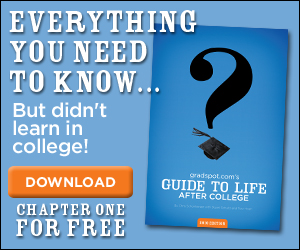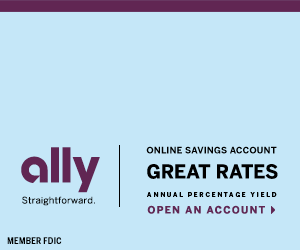Choosing a Bank

- Choose wisely – The first thing you want to think about when picking your bank is which kind of an account you want. Depending on your budget and your needs, you have a number of options, the most popular being a basic checking account or a savings account.
- Put your money to work – Consider putting your money in an online savings account, a CD, or a money market, no matter what your income. Check out this article to learn about other investment opportunities.
- Beware the fees – Big banks earn a lot of revenue for charging customers for services they don't really want. Read the fine print before you make your choice and be on the lookout for minimum balance fees, ATM fees, checking fees, and bounced check fees.
- The credit trap – The easiest way to plunge yourself into debt is to start swiping plastic like a maniac and later discovering you have no money to pay for it at the end of the month. Don't treat credit cards as if they were free money—they're not!
- Switching banks – If you are switching banks, make sure all you have your ducks in order first (e.g., make sure all checks have cleared, notify your employer of the change if you receive payment by direct deposit, etc.).
Being suspicious of “banking” is a time-honored tradition that dates back to the days of ancient Greece, when gold was horded in temples by lecherous, inbred priests (at least according to the movie 300). Sometime later, Adam Smith used his “invisible hand” to invent capitalism
, or, as it’s now known, “eBay,” and banks resembling the ones we know today were born.
Things are pretty well regulated these days, but it is still good to bring a healthy amount of wariness to the process of choosing the right bank. Bear in mind that banks make up to 40% of their revenue from the fees they charge on consumer accounts. Like going to the movies, the “feature presentation” (i.e., an account) lures us in and then they turn the screws with overpriced concessions like Swedish Fish and Milk Duds (the banking equivalent of extraneous charges for things we only sort of want).
Getting kicked off the rents’ account sucks, as does cutting ties with the “Bank of West Hicksville” that gave out free Nalgenes during freshman-year orientation. But it’s time to move on. Like many things that are boring in life, choosing a personal banks seems like an arduous task, but a little research and effort can lead to a lot of saved time and money down the line.
Pick an Account, Any Account
Bank accounts are a dime a dozen, and when it comes to basic options most of the major players offer pretty similar terms. Still, you should familiarize yourself with the popular types of accounts before proceeding. It’s worth pointing out that the ability to write checks becomes a lot more important in post-college life when you’re paying rent and other bills, so make sure you will not have to pay extra fees to write the number of checks you need each month.
Basic Checking Account
- No minimum balance
- Can write checks
- Keep money safe but earn little or no interest
Negotiable Order of Withdrawal (NOW) Checking
- Earn interest as long as a minimum balance is maintained
- Can write checks
- Pay penalty fee for dipping below min. balance
Savings Account
- Earn higher interest (around 5%)
- No check writing
- More fees than basic checking account, including penalty for dipping below min. balance
Money-market Account
- Earn higher interest
- Must maintain higher minimum balance (sometimes $1000-$2500)
- Limited or no check writing
Visit Money Central to compare rates and find a checking, savings, and money market account in your area.
So What to Choose?
Here’s a basic guide for what to get depending on how much dough your stacking. However, be sure to assess your own habits and other places that you might put your extra funds.
Low-income
A free checking account with low monthly fees.
Moderate Income
Basic checking with savings account to earn some interest while maintaining the freedom of checking.
High Income
NOW checking with money market account.
Note that there are many other options besides the basic bank account. No matter what your income level, it might make sense to make your money work harder for you in an online checking or saving’s account, a CD, or a money market account. Check out our articles Understanding the Benefits of Investing and Discovering Investment Options.
Snakes in the Grass
Ok, now that the forest has been chosen, it’s time to explore the trees in this arboretum of banks. Bank of America is a Redwood, Chase Manhattan is an oak, and HSBC is a beautiful fern. They may look big and powerful, but ‘neath the branches lurk predators. Before choosing a tree on which money may or may not grow, consider the fine print: Fees that you didn’t bother to read about when you saw the cool Superbowl commercial will be your downfall. Here are some common traps to look out for:
Minimum Balance
Many checking accounts will carry a built-in fee for dipping below a set balance, which obviously hurts young people prone to hover right around that balance.
ATM Fees
Some banks have a maximum number of times a customer can use an ATM without being charged. Also, going to another bank’s ATM may incur charges from both that bank and your own. If an ATM is not convenient, consider taking a couple week’s worth of cash each time you go—doing this might also help you budget your spending better, though it could also lead you to blow it all in one night.
Checking Balance
Some banks charge customers to check their balance over the phone, but online it is always free.
Bounced Checks
Be wary of “bounced-check protection” policies that many banks automatically enroll customers in. The bank then covers your “non-sufficient funds” checks up to certain limit, but you end up paying the standard NSF fee until you settle the score. Generally, it is better to enroll in the standard overdraft protection plan; the fee is smaller and the bank will just cover overdraft expenses by drawing on your savings, credit card, or line of credit.
Security
It's unlikely that any bank will go belly up, but hey, you can never be too careful in a bad economy. Just remember that the bigger banks are not only more secure, but they often have easier and faster customer service (i.e., phone and online support).
Credit Cards
While they seem like free money, they are bad news bears for anyone who is impulsive or doesn’t have the money to pay off the bill. I thought about signing up for loads of credit cards, balling out of control, and then faking my own death, but then I saw Tupac’s mom crying on TV and couldn’t bring myself to do it. Check out our guide to picking the right credit card, and beware of these banking traps.
That said, even your debit cards can get you in trouble since certain transactions place holds on your funds or don't register immediately in your account, thus increasing the risk of an overdraft if you're not on point. When faced with the "credit or debit" query while panicking at CVS buying condoms, always choose credit (even if you have a debit card) to avoid fees. Also, beware that choosing debit at gas stations can leads to blocks on your funds. Learn more here.
Tip: Choose online banking. One of the benefits of going with a major bank is the convenience it can provide in online banking and phone support. Online banking offers more freedom (you are no longer a slave to “banking” hours), avoids extraneous fees, and helps reduce the paper trail that is a bull’s-eye for identity theft. (I thought I was immune to identity theft until someone tried to steal my thunder and I realized that my identity would be the next logical target.) On top of all that, it’s good for the environment. If your employer offers “Direct Deposit” you should sign up for that as well—it’s easier for everyone and avoids “human errors” like leaving paychecks at the bar. Check out more tips on streamlining banking
Switching Accounts
If you are switching accounts as opposed to just opening your first account, here are a few tips for making the transition as seamless as possible.
- Open the new account before you close the old one so you aren’t left stranded without a debit card or the ability to write checks.
- Make sure all outstanding checks have cleared before closing the account so that you don’t accrue bounced check fees and threats from your landlord.
- If you have signed up for direct deposit of paychecks and/or benefits from your employer, make they know to redirect the next payment to your new account. The same idea applies to any bills that you pay through automatic bill pay.
- Check out this article for more helpful tips.
Bottom Line
Recent grads likely won’t have all that much money and even less time. So in choosing a bank it might be worth it to go for the easiest and most convenient instead of the best deal. We just want no hassle, no strings, and no B.S. Good luck.






Comments
(1)good advice! thanks!
POST YOUR COMMENT